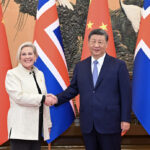77 Pilot Measures to Be Replicated and Promoted Nationwide
In July, the State Council issued a notice on replicating and promoting pilot measures to fully align with high-standard international economic and trade rules, advancing high-level institutional openness. The 77 pilot measures from the Shanghai Pilot Free Trade Zone will be replicated nationwide, further unleashing the benefits of institutional innovation.
The Shanghai Pilot Free Trade Zone has been testing new systems and exploring innovative approaches, continuously achieving breakthroughs in institutional reforms and providing valuable experience for steadily expanding institutional openness.
Innovating Supervision Models to Build a Shipping Hub
At Shanghai South Port, a roll-on/roll-off ship docks steadily at the shore as a batch of electric vehicles for export drive into the ship’s hold under the “direct release” model.
“Under this model, companies no longer need to declare customs. By submitting a self-declaration for direct release, goods can move directly in and out of the Yangshan Special Comprehensive Bonded Zone, significantly improving clearance efficiency,” explained a representative from Yangshan Customs under Shanghai Customs.
Supervision innovations have accelerated the growth of bonded transit services for automobiles with production and markets located overseas. Aiming to build a global shipping hub, the Shanghai Pilot Free Trade Zone has optimized international transshipment and consolidation operations, exempting goods shipped from overseas, transshipped via Yangshan, and destined for third countries from inspections. This has reduced overall processing time by 50%, increasing Yangshan Port’s share of international transshipment cargo from 12.6% to 18.6% and elevating its global container port performance ranking to first place.
“In the first half of this year, around 52,000 bonded transit vehicles were shipped via consolidated vessels, reducing logistics costs,” said Gong Liang, manager of the planning and scheduling department at Shanghai Haitong International Automotive Terminal Co., Ltd.
“Shanghai Port’s efficiency in international transshipment and consolidation leads the global port industry, with cross-port processes shortened to within five days,” noted Zhu Rong, deputy general manager of SIPG Logistics LCL Services (Shanghai) Co., Ltd. “Innovative models, optimized logistics, and cost control have attracted numerous domestic and international shipping companies. We will continue advancing digital transformation in international transshipment and consolidation.”
Enhancing Trading Platforms to Facilitate Data Flow
Promoting and regulating cross-border data flows, advancing digital technology applications, and expanding data sharing—Shanghai is pioneering the implementation of high-standard digital trade rules.
At the Shanghai Data Exchange in Pudong New Area, intangible data products are a hot topic among businesses. How can higher-precision data trading needs be met?
The Shanghai Data Exchange has established a cross-border data trading system, built a trusted data delivery framework, and released a comprehensive rulebook, gradually constructing the foundational structure for data trading. In the first half of this year, the exchange’s trading volume exceeded 3 billion yuan, a year-on-year increase of over 50%.
Secure and efficient cross-border data flows are crucial for corporate globalization.
On the electronic display at the Lingang New Area Cross-Border Data Service Center, real-time operational guidelines for various industries are shown. For smart connected vehicles, guidelines are subdivided into scenarios like multinational manufacturing, global R&D testing, global after-sales service, and used car trading.
“Previously, cross-border data flow policies were industry-specific, lacking relevance for individual businesses,” explained Lu Sen, director of the data department at the Lingang New Area Administrative Committee. “We’ve identified key data fields requiring cross-border flow and collaborated with authorities to compile targeted lists, better addressing real-world business challenges.”
In February, Lingang New Area and the Shanghai Cyberspace Administration jointly released a negative list for data exports under the Shanghai Pilot Free Trade Zone. In May, operational guidelines for data exports were issued.
Aligning with International Standards to Expand Financial Openness
Shanghai’s Pilot Free Trade Zone has achieved many financial “firsts”—China’s first foreign-controlled wealth management joint venture, first wholly foreign-owned public fund, and the establishment of an international oil and gas trading center, including the first cross-border digital yuan settlement for crude oil. It has also piloted relaxed restrictions on non-resident M&A loans.
Beyond these milestones, deeper and broader innovations continue—optimizing cross-border capital pools for multinational corporations, advancing international payment services, and enhancing the functionality of free trade accounts.
With “China tours” and “China shopping” booming, how can inbound payment convenience be improved? Leveraging the zone’s innovative policies, Ant International introduced Alipay’s “link overseas cards



